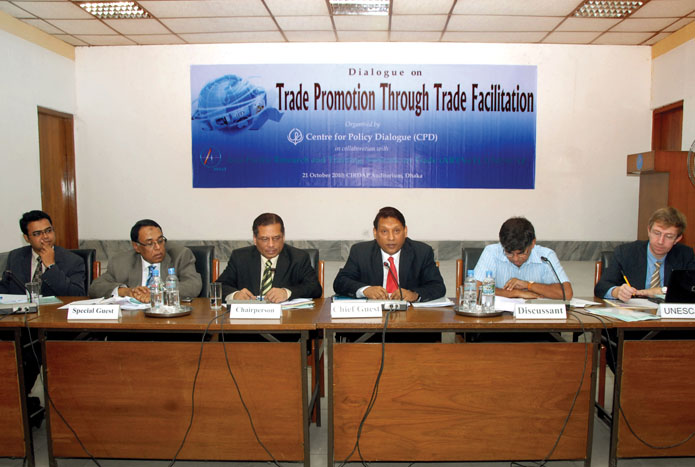The dialogue on Trade Promotion Through Trade Facilitation was organised by CPD in collaboration with Asia-Pacific Research and Training Network on Trade (ARTNeT), UNESCAP, on 21 October 2010, at the CIRDAP Auditorium, Dhaka where Mr Md Ghulam Hossain, Hon’ble Secretary, Ministry of Commerce attended as the Chief Guest.
The dialogue was based on a CPD-ARTNeT study which was undertaken to review the business process analysis of selected commodities in order to identify the steps and associated costs involved in an international trade. The objective of the study was to design a set of policy recommendations to be taken into account both by the policymakers and business community with a view to simplifying and improving the overall trade process.
While presenting the keynote paper titled “Simplification of Trade Processes and Procedures in Bangladesh: Results from Business Process Analysis (BPA) of Export and Import Procedures for Selected Commodities,” Mr Syed Saifuddin Hossain, Senior Research Associate of CPD observed that export/import processes in Bangladesh are, in general, business-friendly and even the number of documents required to complete the process is also within an acceptable limit. However, problems arise when different trading partners ask for different documents in the process of exporting or importing of the same product. The study revealed that it takes 25 days in Bangladesh to complete the official procedures of exporting across the border, whereas in India, Japan and Thailand the procedures can be completed in 17, 10 and 14 days respectively. In case of import procedures, Bangladesh needs 32 days, whereas India, Japan and Thailand spend 20, 6 and 13 days respectively. CPD recommended immediate automation of all customs houses, and establishing a ‘Single Window’ so that all the actors involved in the business process are linked together. The study also suggested that strengthening collaboration between government and business chambers must be ensured for a better business environment in the country. Dr Yann Duval, Economic Affairs Officer of UNESCAP, while presenting his keynote paper titled “Trade Facilitation: An Asia-Pacific Perspective” said that trade facilitation aims to increase the cost-effectiveness of international trade transactions and the simplification and harmonisation of international trade procedure. He cited the benefits of the trade facilitation such as lower transaction cost, reduced average transaction time, increased timeliness and compliance with new security initiative requirements resulting in improved trade competitiveness and improved economic growth prospect.
Speaking as the Special Guest, Mr Mir Nasir Hossain, the Former President of FBCCI said that trade facilitation measures are initiated to enhance the procedure of trade by lessening the cost and time. Chittagong Port, being the lifeline of the country, is so ill-managed that it has become too difficult to handle. The RMG export business depends on the timely delivery of the product, which if missed, becomes costly both for the exporter and importer, he added. He emphasised the need for a large port immediately and a good expressway for the Dhaka-Chittagong route. He recommended to form a private sector forum for negotiation with the government to facilitate any trade-related problems. Capacity building is required for both public and private sector, he added.
Commerce Secretary Mr Md Ghulam Hossain credited the government along with the business community for the country’s robust performance in export, resulting 33 per cent growth rate in the first quarter of the FY2010-11, despite fierce competition. Talking about trade facilitation, he said, “We have still long way to go, and there are at least 4 dimensions – clearance of goods, customs procedure, regulatory framework and information technology.” The Secretary observed that compliance is a very serious issue in Bangladesh, and the persistent ignorance about this indicates that there are serious capacity problem. Lack of awareness among people regarding the services that government provides is another important issue to be addressed, said the Secretary.
Among the Discussants, Bangladesh Tariff Commission’s Joint Chief Dr Mostafa Abid Khan observed that government has to play the vital role to increase country’s export growth, and the private entrepreneurs need to be equipped with smooth information system for this purpose. In his concluding remarks, CPD Executive Director Professor Mustafizur Rahman said that Bangladesh is lagging behind her competitors though she is doing well and there is still room to improve. However, Bangladesh has to work on the ICT sector, infrastructure development, formulation of correct trade policy and strengthening government organisations in order to benefit properly from trade facilitation. In this regard, he noted that non-tariff barriers are the issues need to be addressed today more than the tariff issues.


